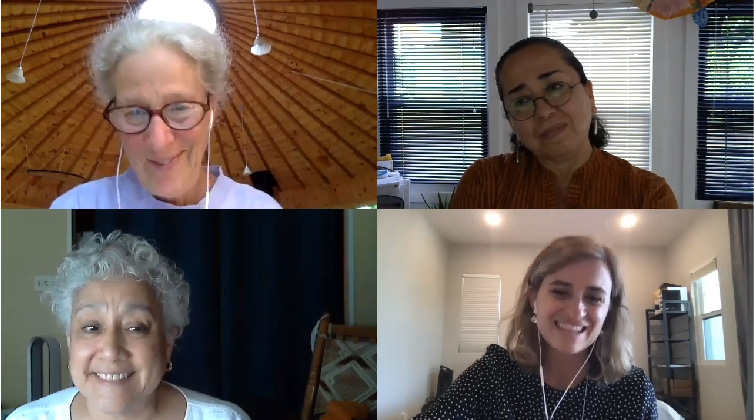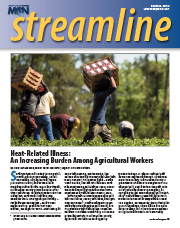
Lois Wessel, DNP, FNP-BC: Bringing Expertise to MCN’s Diabetes ECHO
Part of MCN’s success with the ECHO Diabetes series can be attributed to the contributions of expert faculty and course developer, Lois Wessel, DNP, FNP-BC. For Wessel, joining Migrant Clinicians Network's Diabetes ECHO as a Clinical Specialist was an easy decision. Wessel had evaluated MCN's previous Project ECHO series for her doctoral research, giving her insight into MCN's approach as well as close familiarity with the ECHO model. She also speaks Spanish fluently and has trained CHWs previously in the US and in Latin America. Wessel ran a diabetes clinic in a mobile van serving day laborers for Mobile Medical Care, Inc., and additionally has extensive experience in battling diabetes as a family nurse practitioner at CCI Health and Wellness, a community health center in Maryland. “It's hard to be a primary care provider and not have experience in diabetes, because there's so much of it,” Wessel noted. She also has previous clinical experience in mobile medical care and has worked closely with uninsured patients. So, when Migrant Clinicians Network's Director of Education and Communication, Jillian Hopewell, MPA, MA, asked her to join as faculty, she could hardly say no.
"Working with Lois was an obvious choice for us,” said Hopewell. “We have known one another for years and I’ve always been impressed with her clinical skills, commitment to health justice, and her understanding of the critical role that CHWs bring to health care.”
In 2016, Migrant Clinicians Network (MCN) began formulating an online Spanish-language learning series for community health workers (CHWS) on diabetes using Project ECHO, an educational model to reduce health disparities in underserved regions. ECHO, which stands for Extension for Community Healthcare Outcomes, was developed by the University of New Mexico School of Medicine, and uses a 'hub and spoke’ knowledge-sharing approach to help primary care clinicians enhance their knowledge of and ability to treat health conditions of increasing complexity. Expanding on this concept, MCN decided to try this model for small groups of CHWs from health centers around the country. The CHWs gather on Zoom to receive trainings, talk through their most challenging situations, gain new insights and connections, and get feedback from colleagues and experts around the country. As MCN’s Project ECHO series are often in Spanish, these learning sessions are among the few of its kind in the country and are highly popular.
Alma Galván, MCH, Senior Program Manager of Environmental and Occupational Health, and Martha Alvarado, Program Coordinator of Education and Online Training, had developed the initial curriculum and coordinated the speakers for the pilot year. The first year was quite successful, although, like any piloted project, it had room to improve.
“The first year we implemented the ECHO Diabetes series, it was very well received by the participants,” recalled Alvarado. “I don’t think any of them had ever been engaged in a learning series that was not only provided in Spanish, but also provided them access to clinical experts who speak Spanish. I think it was even more shocking to them that our experts offered the CHWs their expertise beyond the series, encouraging them to reach out for consultation or with questions or concerns regarding their own patients.” The graduates of the series have developed into a community of health care professionals who are able to better serve special populations that have unique challenges and barriers when it comes to understanding and managing diabetes, Alvarado added.
Participants in the first year showed a 43.3% increase in knowledge overall, with the highest change in knowledge about treatment options for diabetes. “The most difficult part of that first year was getting the participants to feel comfortable with open dialogue between themselves and the clinical experts -- getting used to a dynamic where they were running the sessions, not the presenters,” recalled Alvarado. “The clinical experts were there to meet their needs, so they could meet the needs of their communities. Innovation at its best!”
When Lois Wessel, DNP, FNP-BC, joined the team (see sidebar on Wessel), MCN was preparing for its second year, with these difficulties in mind. “There was a huge learning curve – and we’re still getting better at it,” Wessel noted. Over the next few years, “we learned how to engage the learners more, make them more interactive.” They also more closely tailored the education to the questions and knowledge gaps of the participants, which can vary widely. Frequently, Wessel finds that CHWs do not respond well to the highly medicalized language that ECHO in general is based around. For example, “the training for CHWs has never been to ‘present a case,’” the language that ECHO uses. “It’s just changing the language -- ‘would you like to share a story of a challenging patient?’ We’re not talking about sharing a case. We learned that.” Many are unfamiliar with the participatory model, having received only didactic education in the past. The ECHO model emphasizes short didactic sessions followed by interactive sessions. To ease into the model, however, MCN decided to allow for longer presentations at times. “Some of our CHWs are so hungry for information that is given in their own language, that they like these 45-minute presentations,” Wessel admitted. Such minor accommodations encourage greater participation as the course progresses, Wessel said.
The team also developed measurement tools to ensure that participants are leaving the ECHO project with the intended goals and knowledge. “Every year, we discuss healthy eating habits, the importance of exercise, possible complications, and the role of insulin,” Alvarado said. “In the second year of the series, we also focused on using Motivational Interviewing as a tool to help CHWs engage with their patients in a way that empowered them to be proactive when it comes to management of their own diabetes.” At the end of the second year of the series, participants gave the series a rating of 4.9 out of 5.0 on the applicability of concepts learned and/or reinforced.
The next couple of years were more heavily focused on complications due to improper or a lack of management. The participants were given more detailed information on how vision, renal, heart, and foot complications develop, a progression of the disease that many of them were unfamiliar with in detail other than knowing consistently high glucose and hemoglobin A1c numbers can potentially lead to severe complications. “One of the most highly praised sessions provided a very comprehensive training on how to properly conduct a foot examination, what should be asked, and why,” Alvarado said.
Another big emphasis that has been incorporated in the last couple of years is the mental health aspect of living with a chronic disease. “It’s an effect of diabetes that many of our participating CHWs have had little to no experience with, but now that is has been incorporated into the curriculum, they are able to learn how to apply tools that will help them address the mental health needs with their patients,” explained Alvarado.
Over the years, the series has seen an increase in overall knowledge transfer rates from around 20% to almost 45%, with an increase in knowledge of specific diabetes-related topics approaching 70%. CHWs have joined from health centers from across the country -- including Washington, California, New Mexico, Kansas, Colorado, Kentucky, Pennsylvania, New York, North Carolina, Florida, Maryland, Puerto Rico and elsewhere.
“As the facilitator, I’ve found that one of the most fascinating aspects of MCN’s ECHO Diabetes series is the incredibly diverse backgrounds of the participants. Some have been working in health care for little more than one year, and some have decades of experience under their belts,” Alvarado reflected. She also related that some were born and raised in the United States, while others come from Mexico, Nicaragua, Honduras, and other Latin American countries. Participants may be medical doctors in their country of origin but not formally educated here, or have no formal education in their country of origin, but have earned a high school diploma, completed a two-year degree, or received on-the-job training in the US. “Despite these differences, they come with such dedication to their communities and willingness to learn from the experts and each other -- any and all information and skills that have the potential to benefit those that have been consistently overlooked by the health care system that was not developed to accommodate their specific needs,” Alvarado said.
There are limitations to the ECHO model. “ECHO, like many things, works best if everybody has their camera on, but [participants] might be in a clinical setting where they don’t want to have their camera on, or the technology needs for ECHO might not be available to all people,” Wessel said. The COVID-19 pandemic has resulted in a reduction of technology issues, as more people are familiar and comfortable with online education.
This year’s series, which began in May, was once again very popular. MCN received close to 100 applications, only accepting around 30 (a number that is considered to be on the high end for the incorporation of the ECHO model). In addition to the standard ECHO series, MCN restructured its offerings in early 2021 to provide diabetes trainings specifically to clinicians from health centers in Puerto Rico, where multiple disasters – Hurricane Maria, earthquakes, and COVID-19 – have compounded health needs. CHWs are an integral part of reaching the most vulnerable and hardest-to-reach community members to help them prepare for a future crisis while managing their diabetes. The series, sponsored by the Puerto Rico Primary Care Association, had over 60 applications from nine health centers. The content was adapted to include Puerto Rico’s specific quality improvement goals around diabetes. “We had a lot of epidemiological data on which centers have high A1cs... what documentation you need to do, how to use the electronic health record to pull up your goals,” Wessel said. Several CHWs who completed the course have signed up for the standard Diabetes ECHO, indicating their interest in taking it a step further to gain tools specifically to work face-to-face with patients with diabetes.
As for future years, Wessel is confident that MCN will continue to refine its Diabetes ECHO offerings to meet the needs of future CHWs and their patients with diabetes. “MCN does a good job connecting with people who work in the community,” she said. “I think we’re getting even better at it.”
MCN’s Project ECHO page is available in English and Spanish: https://www.migrantclinician.org/project-echo

Read this article in the Summer 2021 issue of Streamline here!
Sign up for our eNewsletter to receive bimonthly news from MCN, including announcements of the next Streamline.